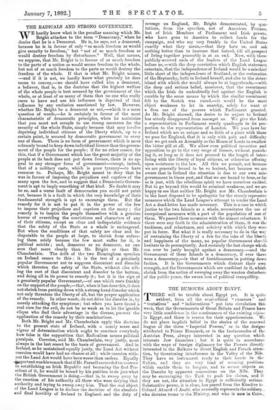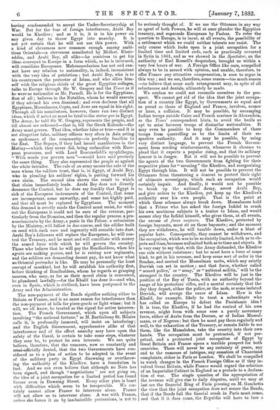THE RUMOURS ABOUT EGYPT.
THERE will be trouble about Egypt yet. It is quite evident, from all the semi-official " rumours " and " tentatives" and "indiscretions " put into circulation this week, that the Governments of Great Britain and France have very little confidence in the continuance of the existing regime in Egypt, and there is reason for their apprehensions. We do not place implicit belief in the stories of the renewed league of the three "Imperial Powers," or in the designs attributed to Prince Bismarck, or in the fanfaronades of the Austrian Press, always interested in any question which interests Jew financiers ; but it is quite in accordance- with the ways of foreign diplomacy for the Powers directly interested in the Balkans to divert English and French atten- tion, by threatening interference in the Valley of the Nile. They have an instrument ready to their hands in the Sultan, and they are very fond of securing positions which enable them to bargain, and to secure objects on the Danube by apparent concessions on the Nile. They may be encouraging the Turk to push his claims, and ii they are not, the situation in Egypt is sufficiently serious. Substantive power, it is clear, has passed from the Khedive to. Colonel Ahmed el Arabi, who avowedly represents the soldiery,. who dictates terms to the Ministry, and who is now in Cairo,
having condescended to accept the Under-Secretaryship at War. But for the fear of foreign interference, Arabi Bey would be Khedive ; and as it is, it is in his power on
any given day to throw Egypt into anarchy. It is not yet certain that he will not use this power. With a kind of cleverness now common enough among ambi- tions Orientals—a cleverness manifested by Midhat, Khair- eddin, and Arabi Bey, all alike—he contrives to get his ideas conveyed to Europe in a form which, as he is informed, will conciliate Europeans. Mahommedanism has not and can- not have any relation to nationality, is, indeed, inconsistent with the very idea of patriotism ; but Arabi Bey, who is to his countrymen the protector of Islam, and who allies him- self with the religious chiefs of the great Egyptian colleges, talks to Europe through Sir W. Gregory and the Times as if he were as nationalist as Mr. Parnell. He is for the Egyptians, first of all ; believes in the Notables, whom he would execute if they advised his own dismissal ; and even declares that all Egyptians, Mussulinans, Copts, and Jews are equal in his sight. Through all his manifestoes, however, there run two distinct ideas, which if acted on must be fatal to the status quo in Egypt. The Army, he told Sir W. Gregory, represents the people, and till abuses are redressed—that is, till the Greek Kalends—the Army must govern. That idea, whether false or true—and it is not altogether false, military officers very often in Asia acting as spokesmen of the community—is perfectly familiar to the East. The Sepoys, if they had issued manifestoes in the Mutiny—which they never did, being unfamiliar with Euro- -peen processes, and with Lord Beaconsfield's apophthegm, • " With words you govern men "—would have said precisely the same thing. They also represented the people as against the white intruder. The rule of an army means the rule of the man whom the soldiers trust, that is, in Egypt, of Arabi Bey, who in pleading his soldiers' rights, is putting forward his own claim. The second idea shows the result to which that claim immediately leads. Arabi Bey does not directly -denounce the Control, but he does say frankly that Egypt is sick of the European instruments of the Control, that some are incompetent, some unworthy, and some too highly paid, and that all must be replaced by Egyptians. The moment this demand is overtly made the Control must resist, for with- -out the Europeans it could not be sure of the revenue, par- ticularly from the Domains, and then the regular process, a pro- nunciamiento by the Army, a panic in the Palace, a submission by the Ministry, will follow in due course, and the edifice built on sand with such care and ingenuity will crumble into dust. Axabi Bey's followers will replace the Europeans, he will con- trol the Treasury, and he must and will conciliate with money the armed force with which he will govern the country. Those who believe that he will pay the Bondholders, when his agents are making purses, and he is raising new regiments, and the soldiers are demanding decent pay, do not know what an Oriental pretender is like. He may be personally the least corrupt of mankind, but he will establish his authority first, before thinking of Bondholders, whom he regards as grasping usurers, who may, as far as their moral claim is concerned, be plundered lawfully—for the Khalif has done it—and who, even in Spain, which is civilised, have been postponed to the Army and the Administration.
The non-payment of the Bonds signifies nothing either to Britain or France, and is no more reason for interference than the non-payment of bills for piece-goods or light wines; but it will, we all know, be treated as the signal for active interven- tion. The French Government, which upon all subjects involving "the national fortune," as M. Barthelemy St. Hilaire calls it, is profoundly immoral, will insist on interfering ; and the English Government, apprehensive alike of that ' interference and of the effect anarchy may have upon the • safety of the Canal, is certain to take some steps, whatever they may be, to protect its own interests. We can quite • believe, therefore, that the rumours, now so constantly and sexei-officially denied, that the two Governments have con- - sidered as to a plan of action to be adopted in the event of the military party in Egypt disowning or overthrow- ing the authority of the Khedive, have a foundation in fact. And we can even believe that although no Note has been signed, and though "negotiations" are not going on, the idea of a joint occupation for a limited period has found favour even in Downing Street. Every other plan is beset with difficulties which seem to be insuperable. We cer- tainly cannot allow France to intervene alone. France will not allow us to intervene alone. A war with France, unless she forces it on by inadmissible pretensions, is not to
be seriously thought of. If we use the Ottoman in any way as agent of both Powers, he will at once plunder the Egyptian treasury, and supersede Europeans by Pashas. To refer the question to Europe, is to incur, at all events, the possibility of a settlement which we could neither tolerate nor resist. The only course which looks open is a joint occupation for a limited time and limited ends, such as practically occurred in Syria in 1861, and as we showed in the Spectator, on the authority of Earl Russell's despatches, brought us within a very few hours of war. A Foreign Office like ours, compelled always to be in accord with opinion, and unable, therefore, to offer France any attractive compensation, is sure to argue in this way ; and we see, therefore, some reason—too much reason —to believe that some such arrangement may, in spite of all reluctances and denials, ultimately be made.
We confess we could not reconcile ourselves to the pro- spect. We cannot get rid of the idea that the joint occupa- tion of a country like Egypt, by Governments so equal and so proud as those of England and France, involves, sooner or later, a collision. It may be possible, by encamping Indian troops outside Cairo and French marines in Alexandria,- as the Times' correspondent hints, to avoid the broils so apt to arise between troops of dissimilar nationalities. It may even be possible to keep the Commanders of those troops from quarrelling as to the limits of their re- spective authority. And it may be possible, by using very distinct language, to prevent the French Govern- ment from sending reinforcements, whenever it chooses to plead that it expects a popular rising, and that its military honour is in danger. But it will not be possible to prevent the agents of the two Governments from fighting for their respective plans for" securing" the Khedive, and reorganising Egypt through him. It will not be possible to prevent the Ottomans from threatening a descent to protect their right of ultimate sovereignty, which such an occupation would certainly impair. And finally, it would not be possible to break up the national Army, arrest Arabi Bey, and give orders to the Khedive, yet keep up the Khedive's authority over his own people. That is the point at which these schemes always break down. Mussulmans hold that a Prince who has asked the foreign Infidel to crush his own mutinous subjects is a traitor to Islam, and would sooner obey the Infidel himself, who gives them, at all events, the excuse of force majeure. The Khedive, protected by foreign bayonets, must sit on those bayonets ; and the moment they are withdrawn, he will tumble down, under a blast of popular hate. Consequently, they cannot be withdrawn, and the occupation, which was to be so strictly limited, both as to ob- jects and time, becomes unlimited both as to time and objects. ft is very easy to say that, with the Army disbanded, the Khedive can rule without resistance ; but he must have a force of some kind, to get in his revenue, and keep some sort of order in the Soudan, and control the Mussulman mobs, which any saintly Dervish can set in motion ; and that force, whether called "armed police," or "army," or "national militia," will be the strongest in the country. The Khedive will be just in the position of the Bey of Tunis, with no authority beyond the range of his protectors' rifles, and a mental certainty that the day they depart, either the police, or the mob, or some isolated
Dervish, will avenge the cause of Islam. How is the Khalif, for example, likely to treat a subordinate who has called on Europe to defeat the Panislaraic idea ? It is true, the Khedive, if he had the control of his own revenue, might form with some ease a purely mercenary force, either of Arabs from the Deccan, or of Indian Mussul- mans, or of Negroes ; but then he must pay them regularly and well, to the exhaustion of the Treasury, or remain liable to see them, like the Mamelukes, take the country into their own hands. The occupation must be protracted, if not per- petual, and a protracted joint occupation of Egypt by Great Britain and France opens a terrible prospect for both countries. There will never be any certainty of peace, any end to the rumours of intrigue, any cessation of Chauvinist complaints, either in Paris or London. We shall be compelled to watch changes in the French Foreign Office as if they in- volved Great Britain, while France would regard the selection of an Imperialist Cabinet in England as a prelude to a declara- tion of war. The single question of the appropriation of the revenue will give rise to daily disputes, until we may at last see the financial Ring of Paris pressing on M. Gambetta the view that the joint occupation does not secure the Bonds, that if the Bonds fail the fiancial crash in Paris must come, and that if it does come, the Republic will have to face a counter-revolution. We have no suggestion to offer, save our old and discredited one, that France should be compensated for allowing England to garrison Egypt, but we cannot believe that joint occupation is a solution which the Foreign Office should seek.
















































 Previous page
Previous page